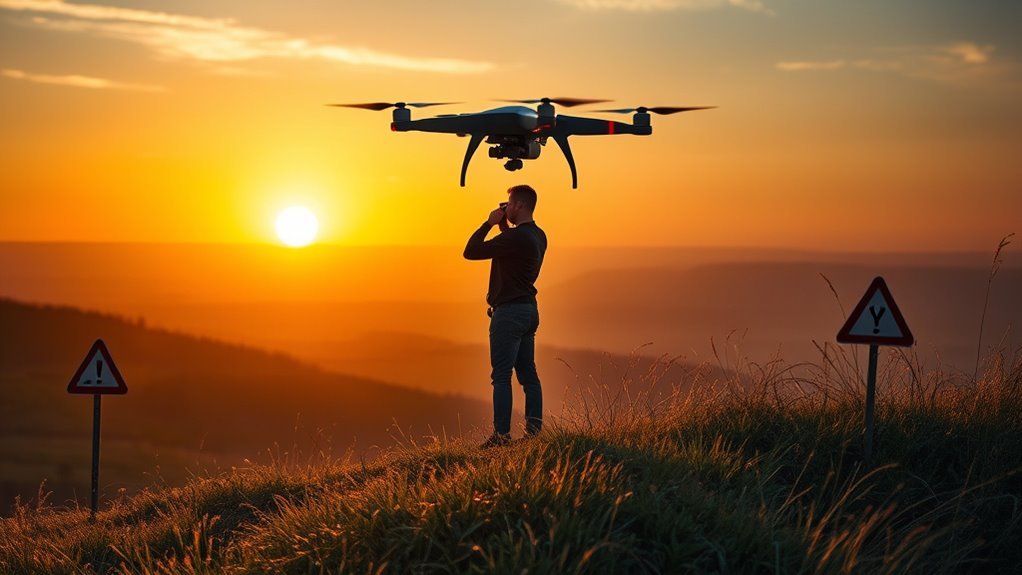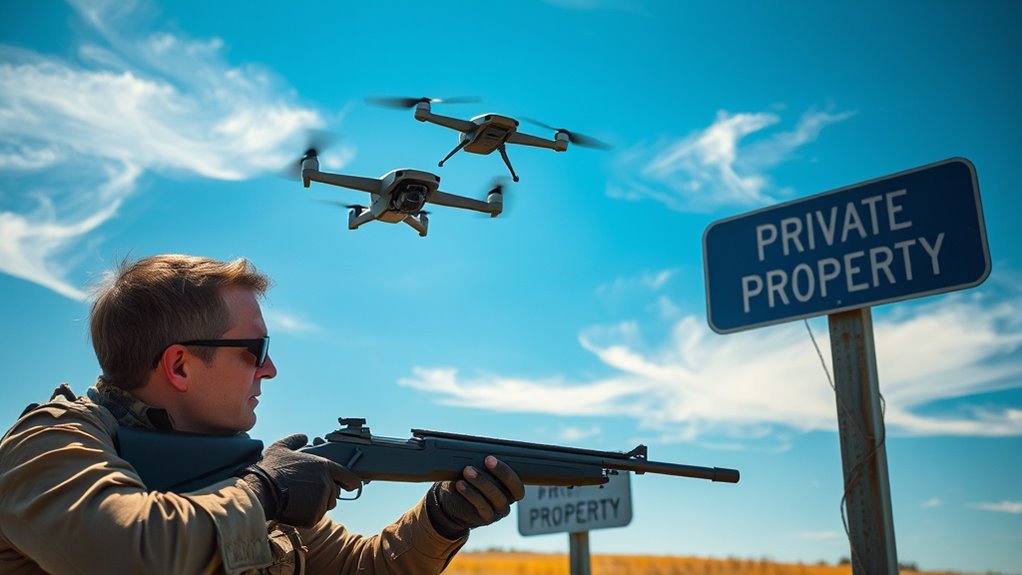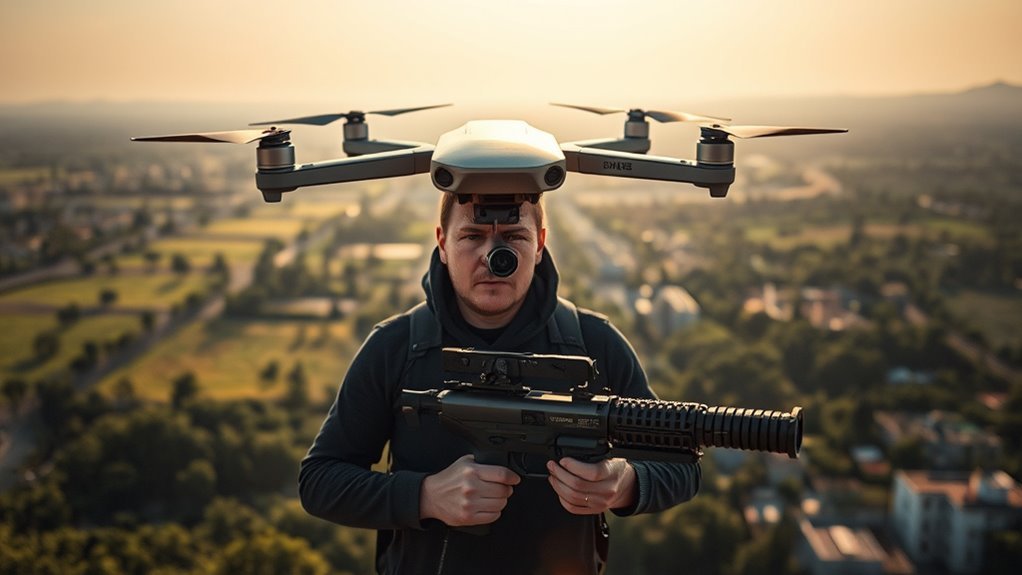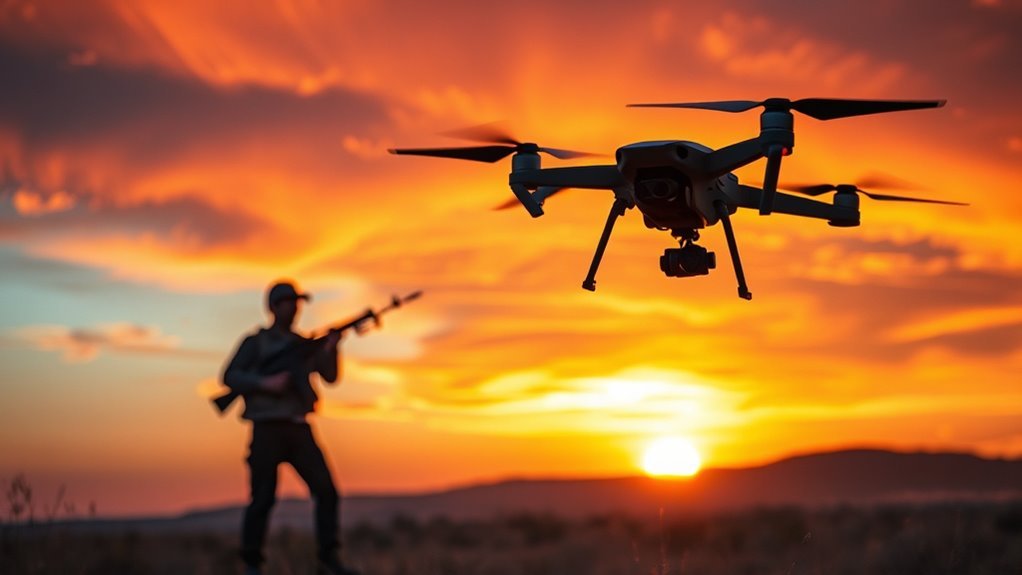Maneuvering the laws around shooting down a drone can be tricky. Each state has its own regulations, often governed by property rights and FAA guidelines. While self-defense claims have been made, damaging someone else’s property can lead to legal issues. Consider your local privacy laws as well, as drones may intrude on personal space. Instead of destructive actions, exploring alternatives like reporting the drone may be more prudent. There’s more to understand in this evolving legal landscape.
Understanding Drone Laws in Your State

When considering the legality of shooting down a drone, it is imperative to understand the specific laws governing drone use in your state. Each state has unique drone registration requirements and regulations that dictate how drones can be operated. Familiarizing yourself with these state-specific regulations is vital, as they often outline the permissible actions you can take if a drone invades your privacy or poses a threat. Some states may explicitly prohibit the shooting down of drones, while others might allow it under certain conditions. Ensuring you know your state’s laws can help protect your rights and freedoms while avoiding potential legal consequences. Always stay informed to navigate this complex landscape effectively, as federal laws regulate drone use to guarantee safety in national airspace.
Property Rights and Airspace Regulations

Although the concept of property rights typically extends to the land you own, it becomes more complex when addressing airspace regulations. Airspace ownership isn’t as straightforward as land ownership; your rights generally don’t extend indefinitely above your property boundaries. The Federal Aviation Administration (FAA) governs navigable airspace, meaning drones can typically fly over your land without infringing your rights. This creates a tension between individual property rights and federal regulations. If a drone crosses into your airspace, you may feel justified in taking action, but legal repercussions can arise. Understanding how airspace regulations interact with your property rights can empower you to make informed decisions regarding drones on or over your land, balancing personal freedom with compliance. Additionally, recognizing the potential for legal consequences when taking drastic measures against a drone is essential to avoid unnecessary repercussions.
Privacy Concerns and Legal Implications

As drones become increasingly prevalent in everyday life, privacy concerns have surged, raising significant legal implications for both individuals and operators. The rise of drone surveillance has prompted fears of privacy invasion, as these devices can easily capture images and video without consent. Laws vary widely, but many jurisdictions recognize the right to privacy, which may conflict with drone operations. If a drone intrudes into your personal space or captures sensitive information, you might have legal grounds for recourse. However, operators often argue for their rights to fly and record in public airspace. Striking a balance between the benefits of drone technology and protecting individual privacy remains a complex legal challenge that requires careful consideration. Understanding federal airspace regulations is essential to navigate these issues effectively. Moreover, the implementation of geofencing technology in drones can help mitigate privacy risks by preventing accidental intrusions into personal spaces.
Self-Defense vs. Destruction of Property
While individuals may feel justified in using force to protect their property from an intrusive drone, the legal ramifications of such actions can be complex. The self-defense justification typically applies to immediate threats against personal safety, not property. When it comes to drones, the line blurs between protecting your rights and committing property damage. If you shoot down a drone, you risk facing criminal charges, as laws often view such actions as excessive force. Courts generally favor the notion that property can be safeguarded through non-destructive means. Fundamentally, understanding the nuances of self-defense versus property destruction is vital. Before taking any drastic measures, consider the legal consequences of your actions and explore peaceful resolutions to your concerns.
Alternatives to Shooting Down a Drone
If you find yourself facing an intrusive drone, there are several alternatives to shooting it down that can effectively address your concerns without incurring legal repercussions. Consider the following options:
- Drone Jamming: Utilizing technology to disrupt the drone’s control signals, rendering it unable to operate effectively. In many cases, laser technology can also be combined with jamming for enhanced effectiveness.
- Signal Interference: Employing devices that create interference with the drone’s communication, causing it to return to its home point or land safely. This technique ensures that you avoid potential legal issues associated with direct engagement.
- Reporting to Authorities: Documenting the drone’s activity and notifying local law enforcement or aviation authorities to handle the situation appropriately. Understanding federal aviation regulations is crucial to ensure that your actions do not inadvertently violate any laws.
These alternatives not only help safeguard your rights but also promote responsible engagement with aerial technology. By choosing non-destructive methods, you can assert your freedom while remaining within legal boundaries.
Frequently Asked Questions
Can I Use a Net Gun to Capture a Drone Legally?
Using a net gun to capture a drone involves maneuvering through complex net gun regulations. You’ll need to guarantee the drone’s presence is unauthorized, as drone capture legality varies by location and circumstances, potentially leading to legal repercussions.
What Penalties Exist for Shooting Down a Drone?
So, you’re thinking about playing drone hunter? Well, penalties for shooting down a drone can range from fines to criminal charges, especially if you violate drone legality or infringe on someone’s property rights. Choose wisely!
Are There Specific Laws for Drones in Urban Areas?
Yes, there are specific drone regulations governing urban airspace. These laws vary by location, often addressing privacy, safety, and air traffic management. Understanding them’s essential if you want to navigate urban drone usage effectively.
Is It Legal to Destroy a Drone on My Property?
It’s not always legal to destroy a drone on your property. While you may assert property rights, drone ownership complicates matters. Understanding local laws is essential before taking any action against an encroaching drone.
How Do I Report an Illegal Drone?
To report an illegal drone, contact local law enforcement or aviation authorities. Provide details about the drone’s behavior and location. Utilizing drone reporting channels guarantees your concerns are addressed while protecting your rights and privacy.

